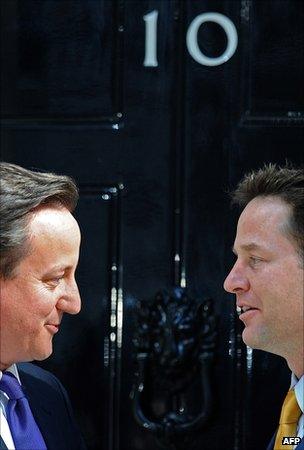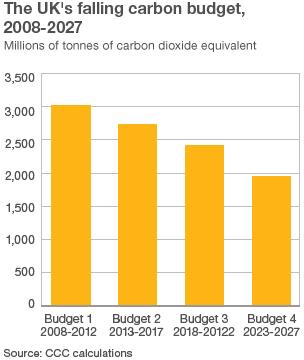UK 'set to miss' climate targets
- Published

The government's "greenest ever" pledge has come under attack on the carbon front
The UK is set to miss climate change targets it is legally bound to meet, according to an independent analysis.
Cambridge Econometrics says, external the UK will narrowly miss carbon budgets up to 2017, and by bigger margins after that.
The government is legally bound to keep emissions within its carbon budgets.
Separately, a report from a coalition of green groups says, external the government is not living up to its "greenest ever" pledge. The government says it is making progress on a number of fronts.
It points out that emissions from the government's own activities, in Westminster, Whitehall and around the country, have fallen by nearly 14% in a single year.
But emissions from the nation as a whole actually grew during 2010, as the economy began a modest recovery from the recession.
According to analysts Cambridge Econometrics, this has helped to put the UK off the trajectory required to stay within its carbon budgets.
"The unmistakable lesson from the effect of emissions reduction policies 1997-2010 is that policies tend to have a lower impact than forecast, and therefore their strength needs to be increased if targets are to be achieved," said Paul Ekins from the Energy Institute at University College London, senior consultant to Cambridge Econometrics.
The country has also missed the target of cutting carbon dioxide emissions by 20% from 1990 levels by 2010 that was set by Labour before coming to power in 1997.
It has been clear for many years that this ambition would not be met, although a recession-induced 10% cut in CO2 emissions during 2009 brought it much closer.
That the country fell short, despite the recession, "shows the policy challenge of carbon emission reduction," observed Prof Ekins.
The majority of greenhouse gas reductions in recent years have been secured in gases other than CO2, notably in curbing methane release from landfill sites.
Sectoral shifts

The carbon budgets agreed by the government run for four successive five-year periods
The government has agreed carbon budgets for four successive five-year periods, running collectively from 2008-2027, following recommendations from statutory advisors the Committee on Climate Change.
The committee has also warned on several occasions that existing government policies would not do enough to meet the budgets.
The 2027 target amounts to a halving of emissions from 1990, the internationally agreed baseline year.
Cambridge Econometrics forecasts that emissions from electricity generation and road transport will fall over the next few years, while a number of sectors - particularly aviation - will pump out increasing quantities of CO2.
However, the analysts acknowledge that a number of government policies such as the Renewable Heat Incentive, external were finalised so recently that it is not possible to model their impact.
"On the face of it, there is still a good prospect that, with these policies, the gap between these forecasts and the now legally binding targets will be closed," said Prof Ekins.
"But the time taken for new policies to be worked up, consulted on and implemented is long, and few new policies will be able to be put in place and be effective even for the third budget period (2018-22), if it becomes clear that emissions are not being reduced as hoped."
The analysts also forecast that investment in renewable electricity generation will not be enough to meet the UK's target, under EU legislation, of producing 15% of its electricity by renewable technologies by 2020.
Tarnished green?
When the coalition government assumed power last year, its leaders pledged to be the "greenest ever" in UK history.
On the climate change front, a report out this week from organisations including the Green Alliance, Christian Aid and Greenpeace says the government is falling short.

The government's aviation policies get a mixed reception from environmental groups
They calculate that the coalition has made 29 low-carbon commitments, spanning the curbing of new airport runways, support for renewable heat and acceptance of the fourth carbon budget.
According to their analysis, the government is making good progress on seven, moderate progress on 16, and failing on the remaining six.
"The government has taken some good decisions in tough economic circumstances, but it is hobbled by a lack of cross-government support for the Coalition Programme," said Matthew Spencer, director of the Green Alliance.
"It will miss opportunities to get economic and political benefit from its policies without more public leadership from the prime minister and greater accountability across Whitehall."
Prominent among the "successes" noted by the report is the government's cancellation of Heathrow's third runway, while the chief "failures" include the absence of a major shift towards green taxes.
It also gains credit for trying to advance carbon cuts on the international front, through attempting to persuade the EU to move from its current target of a 20% cut from 1990 levels by 2020, to a 30% cut over the same period.
Follow Richard on Twitter, external
- Published14 September 2011
- Published30 June 2011
- Published17 May 2011